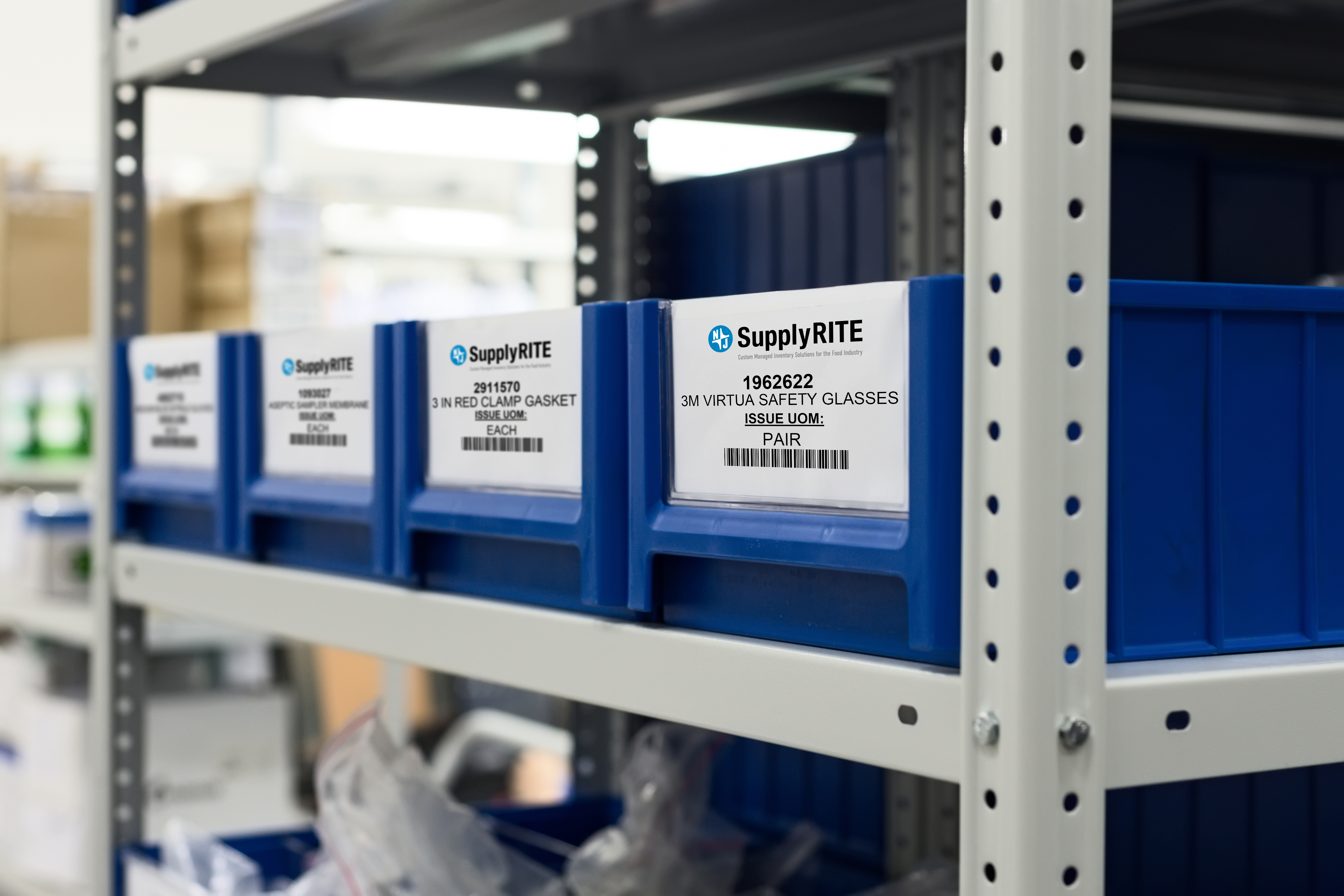At Nelson-Jameson, we recognize that efficient operations are not just beneficial in the competitive food processing industry — they’re essential for sustained success. As your dedicated distribution partner, we are committed to offering cutting-edge solutions that streamline your processes and enhance your profitability. One such strategy is Vendor-Managed Inventory (VMI). Let's explore how VMI can transform your food manufacturing business and improve your supply chain.
What is Vendor Managed Inventory (VMI)?
Vendor Managed Inventory (VMI) is a collaborative supply chain management strategy where the supplier takes on the responsibility of managing inventory levels at the customer's location. This contrasts with traditional inventory management, where the customer is responsible for forecasting demand, tracking stock, and placing orders. With VMI, the supplier uses real-time data to monitor inventory levels and make decisions about replenishment. This data-driven approach ensures inventory is aligned with actual consumption, significantly reducing the risks of both shortages and surpluses. The supplier, not the retailer, generates replenishment orders based on available data and agreed upon Key Performance Indicators (KPIs). This shift in responsibility can lead to a more efficient and responsive supply chain.
The Mechanics of a VMI System
A VMI system relies on several critical elements working in harmony:
- Information sharing: The customer shares crucial data with the supplier, such as historical usage, current inventory levels, and anticipated demand. This exchange can be facilitated through Electronic Data Interchange (EDI) or other automated systems, ensuring seamless and timely data flow. The more accurate data the supplier receives, the better they can predict demand and manage inventory.
- Inventory monitoring: The supplier uses this shared data to closely track the customer's inventory levels. They monitor sales patterns and trends, identify potential stockouts, and understand the rate of consumption to make informed replenishment decisions.
- Proactive replenishment: Based on the inventory data and agreed-upon KPIs, the supplier proactively ships new inventory, ensuring the customer always has the right amount of product available. This approach moves away from the reactive nature of traditional ordering and towards a demand-driven system.
- Performance measurement: Both the supplier and the customer agree on performance metrics such as inventory turnover, service levels, and cost savings. They regularly review these metrics to evaluate the VMI program’s success and to identify any areas that need improvement.
- Legal ownership: Depending on the specific arrangement, the ownership of the inventory might remain with the supplier until it is taken from stock by the retailer, which is known as consignment.
The Advantages of VMI in Food Processing
For the food processing sector, VMI offers a range of compelling benefits:
- Reduced expenses: By optimizing inventory management, VMI can significantly lower the amount of capital tied up in excess inventory. It also minimizes storage costs, reduces the risk of obsolescence, and decreases the need for expedited shipments to cover unexpected shortages. This results in lower carrying costs.
- Enhanced operational flow: Automating the replenishment process frees up valuable time and resources for both the customer and the supplier. Retailers can focus on other core business activities and vendors can streamline their logistics.
- Improved forecasting: VMI relies on real-time sales data and consumption patterns which allows for more accurate demand forecasting, helping to align supply with real-time needs. With access to point of sale (POS) data, suppliers can improve demand prediction and tightly manage inventory.
- Diminished risk: The likelihood of both overstocking and stockouts is substantially reduced. With the supplier taking responsibility for inventory management, they also accept some of the risks associated with slow-moving products, which lowers the financial risk for the retailer.
- Stronger partnerships: VMI fosters a collaborative environment between the vendor and the customer. It builds mutual trust and a commitment to common goals, with retailers often becoming more loyal to vendors due to the complexity of implementing VMI.
- Precise production scheduling: Suppliers gain better visibility into demand trends, allowing them to make more accurate production plans and reduce waste.
VMI: Addressing food processing specifics
The food processing industry has unique needs that make VMI particularly beneficial:
- Perishability: Many food products have a limited shelf life. VMI enables accurate inventory control, minimizing the chance of spoilage and waste. By closely monitoring inventory levels and optimizing replenishment schedules, VMI helps reduce the risk of products expiring before they can be sold.
- Fluctuating demand: Demand for food can vary widely depending on seasons, promotions, and other factors. VMI helps suppliers quickly adjust to these fluctuations, maintaining inventory levels that match actual consumption patterns. Suppliers can analyze data from multiple retailers to plan for local trends.
- Stringent service standards: The food industry often has strict service level expectations, with penalties for non-compliance if these requirements are not met. VMI helps avoid these penalties by ensuring an adequate supply of products at all times.
- Transportation and delivery times: VMI requires that suppliers manage their own transportation and delivery schedules. Suppliers must take into account delivery times and potential delays to ensure inventory is replenished in a timely fashion.
- Storage: Suppliers must also determine if they are delivering goods to a distribution center's doorstep or storing the items in the storage location. Some VMI arrangements even involve suppliers managing store shelves.
Is VMI a good fit for your business?
VMI isn't a one-size-fits-all solution, so assessing if it aligns with your specific needs and operational environment is essential.
VMI is generally suitable if:
- You want to reduce inventory expenses: VMI can reduce inventory holding costs, minimize waste, and eliminate the need for extra storage.
- You wish to improve your service levels and minimize the risk of stockouts: VMI ensures the right products are available at the right time, which minimizes lost sales.
- You seek closer working relationships with your suppliers: VMI encourages a collaborative partnership where both parties work together towards shared goals.
- You have a complicated supply chain or limited in-house inventory management expertise: VMI can be a good option if you lack the resources or expertise to manage your own inventory effectively.
- Your demand is relatively consistent and predictable: This allows the vendor to forecast demand and replenish inventory accurately.
- You want to reduce the administrative burden of inventory management: VMI eliminates the need to manually track inventory levels and place orders, freeing up staff for other tasks.
Successful VMI implementation requires a strong, trusting relationship with your supplier, along with a willingness to share data and utilize technology to ensure transparent communication and collaboration. Open communication, clearly defined roles, and mutual trust are necessary to overcome potential challenges. However, when implemented correctly, VMI can provide significant benefits, making it a worthwhile strategy for businesses seeking to optimize their supply chain and reduce costs and risks.

Potential risks and how to mitigate them
While VMI offers many benefits, it’s also important to be aware of potential risks and how to mitigate them:
- Lack of control/dependency on supplier: You may lose some control over inventory levels and become too dependent on your supplier. Mitigation: Establish clear contracts, service level agreements, and performance metrics. Use real-time inventory management systems to maintain visibility and control.
- Data security concerns: Sharing sensitive data such as sales data and inventory levels increases the risk of breaches. Mitigation: Implement strong cybersecurity measures and data encryption protocols to protect data integrity and confidentiality. Include a confidentiality agreement in your contract.
- Ill-suited systems and messy data: VMI’s effectiveness depends on accurate data sharing. Mitigation: Invest in purpose-built systems that allow secure document transmission. Establish clear agreements on data exchange. Ensure all communication lines are tested before starting.
- Communication failures: Miscommunication can lead to inventory discrepancies and inefficiencies. Mitigation: Utilize a collaborative business network and encourage a culture of open communication. Make sure there is clear communication about changes that could affect sales and inventory levels, such as seasonality, demand spikes, or new products.
- Inflexibility to market changes: Predefined algorithms may hinder swift responses to market shifts. Mitigation: Use flexible AI-driven analytics tools to adjust forecasts and inventory strategies based on real-time data.
- Demand changes: Unexpected demand spikes or reductions can disrupt forecasts.Mitigation: Use good data analytics to help forecast potential scenarios and have contingency plans in place.
- Slow-moving stock: If inventory is not selling fast enough, it could result in overstock. Mitigation: Carefully select the products included in VMI and pay close attention to sales history and target markets.
- Lack of vendor data proficiency: If a vendor is unable to accurately analyze data, the VMI process could fail. Mitigation: Choose VMI partners who have experience with data analysis.
Nelson-Jameson: Your Trusted VMI Partner
As a long-standing and trusted distributor to the food processing industry since 1947, Nelson-Jameson provides SupplyRITE™ Inventory Solutions that are specifically tailored to meet the unique needs of our clients. Our flexible approach includes both customer-managed and vendor-managed inventory options.
We are committed to providing resourceful, proactive support focused on helping you achieve your operational objectives. Our offerings include industrial vending machines as part of a comprehensive suite of inventory management tools. We are dedicated to delivering top-tier solutions that improve efficiency, lower costs, and elevate your overall performance, embodying our commitment to go above and beyond.
We offer a range of services to help you implement the best solution for your business, from analyzing your current processes to ensuring continuous improvement.
We can help you with:
- Analysis of your current inventory processes.
- Identifying opportunities to reduce costs and improve efficiency.
- Implementing the right inventory solutions based on your needs.
- Providing ongoing support and evaluation of your VMI program.
Are you ready to discover how VMI can optimize your operations? Reach out to our team today for a personalized consultation. Let us show you how we can provide the expert logistics you need to succeed. With SupplyRITE™, you can achieve the right stock, at the right place, at the right time.
Inventory Solutions Department Manager
Adam is a 10-year veteran of the food manufacturing industry and builds strong customer relationships through customized CMI/VMI solutions, optimizing customer inventory and streamlining operations.







